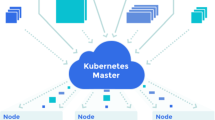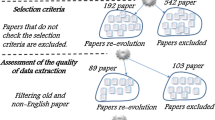Abstract
Presently, cloud computing has become a very popular platform in the computing world. It provides users with high efficient resources on demand. Nevertheless, due to the strong turnout to use the cloud in everything in the Information Technology (IT) field, cloud platforms have become very crowded with heavy loads. Therefore, providers need to use new techniques to manage resources allocation to users. One of the most important techniques, in managing cloud resources, is scheduling technique. Recently, many heuristic and meta-heuristic techniques are developed to solve the scheduling problem. However, each technique is efficient to solve a part of the problem but unable to solve the overall problem. This paper presents a new technique called Water Pressure Change Optimization (WPCO) to solve the scheduling problem in cloud computing. The new WPCO technique is inspired from the phenomenon of water density changing when increasing the pressure due to the changing in the physical characteristics of the water. The new technique is evaluated and compared with the most recent existing techniques. The results indicate that the WPCO can distribute any number of tasks on the available resources in low time complexity. In addition, it improves schedule length, load balancing, resources utilization, memory usage and throughput of the cloud system.

























Similar content being viewed by others
References
Armbrust, M., Fox, A., Griffith, R., Joseph, A.D., Katz, R., Konwinski, A., Lee, G., et al.: A view of cloud computing. Commun. ACM 53(4), 50–58 (2010)
Manvi, S.S., Shyam, G.K.: Resource management for infrastructure as a service (IaaS) in cloud computing: a survey. J. Netw. Comput. Appl. 41, 424–440 (2014)
Bansal, N., Singh, A.K.: Trust for task scheduling in cloud computing unfolds it through fruit congenial. Networking Communication and Data Knowledge Engineering, pp. 41–48. Springer, New York (2018)
Pham, V.V.H., Liu, X., Zheng, X., Fu, M., Deshpande, S.V., Xia, W., Zhou, R., and Abdelrazek, M.: PaaS-black or white: an investigation into software development model for building retail industry SaaS. In: Proceedings of the IEEE/ACM 39th International Conference on Software Engineering Companion (ICSE-C), pp. 285–287 (2017)
Tripathy, L., Patra, R.R.: Scheduling in cloud computing. Int. J. Cloud Comput.: Serv. Arch. 4(5), 21–27 (2014)
Juarez, F., Ejarque, J., Badia, R.M.: Dynamic energy-aware scheduling for parallel task-based application in cloud computing. Future Gener. Comput. Syst. 78, 257–271 (2018)
Kalra, M., Singh, S.: A review of metaheuristic scheduling techniques in cloud computing. Egypt. Inform. J. 16(3), 275–295 (2015)
Feitelson, D.G., Tsafrir, D., Krakov, D.: Experience with using the parallel workloads archive. J. Parallel Distrib. Comput. 74(10), 2967–2982 (2014)
http://www.cs.huji.ac.il/labs/parallel/workload/l_nasa_ipsc/index.html#usage
Shoman, M.A., Attiya, G.M., Morsi, I.Z.: A modified genetic algorithm for load balancing in heterogeneous distributed computing systems. Menoufia J. Electron. Eng. Res. 21(1), 1–18 (2011)
Bellman, R., Esogbue, A.O., Nabeshima, I.: Mathematical aspects of scheduling and applications. In: Modern Applied Mathematics and Computer Science, vol. 4 (2014)
Attiya, G., Hamam, Y.: Task allocation for maximizing reliability of distributed systems: a simulated annealing approach. J. Parallel Distrib. Comput. 66(10), 1259–1266 (2006)
Lam, A.Y.S., Li, V.O.K.: Chemical reaction optimization: a tutorial. Memet. Comput. 4(1), 3 (2012)
Mahmoodi, F., Dooley, K.: A comparison of exhaustive and non-exhaustive group scheduling heuristics in a manufacturing cell. Int. J. Prod. Res. 29(9), 1923–1939 (1991)
Toumi, S., Jarboui, B., Eddaly, M., Rebaï, A.: Branch-and-bound algorithm for solving blocking flowshop scheduling problems with makespan criterion. Int. J. Math. Oper. Res. 10(1), 34–48 (2017)
Lin, Y.-K., Chong, C.S.: Fast GA-based project scheduling for computing resources allocation in a cloud manufacturing system. J. Intell. Manuf. 28(5), 1189–1201 (2017)
Saidi-Mehrabad, M., Bairamzadeh, S.: Design of a hybrid genetic algorithm for parallel machines scheduling to minimize job tardiness and machine deteriorating costs with deteriorating jobs in a batched delivery system. J. Optim. Ind. Eng. 11(1), 35–50 (2018)
Wang, T., Liu, Z., Chen, Y., Xu, Y., and Dai, X.: Load balancing task scheduling based on genetic algorithm in cloud computing. In: Proceedings of the IEEE 12th International Conference Dependable, Autonomic and Secure Computing (DASC), pp. 146–152 (2014)
da Silva, A.S., Moshi, E., Ma, H., and Hartmann, S.: A QoS-aware web service composition approach based on genetic programming and graph databases. In: International Conference on Database and Expert Systems Applications, pp. 37–44. Springer, Cham (2017)
Kołodziej, J., Khan, S.U., Wang, L., Zomaya, A.Y.: Energy efficient genetic based schedulers in computational grids. Concurr. Comput.: Pract. Exp. 27(4), 809–829 (2015)
Shivasankaran, N., Kumar, P.S., Raja, K.V.: Hybrid sorting immune simulated annealing algorithm for flexible job shop scheduling. Int. J. Comput. Intell. Syst. 8(3), 455–466 (2015)
Sabar, N.R., and Song, A.: Grammatical evolution enhancing simulated annealing for the load balancing problem in cloud computing. In: Proceedings of the Genetic and Evolutionary Computation Conference, ACM, pp. 997–1003 (2016)
Zhang, L., Cai, L., Li, M., Wang, F.: A method for least-cost QoS multicast routing based on genetic simulated annealing algorithm. Comput. Commun. 32(1), 105–110 (2009)
Samora, I., Franca, M.J., Schleiss, A.J., Ramos, H.M.: Simulated annealing in optimization of energy production in a water supply network. Water Resour. Manage 30(4), 1533–1547 (2016)
Achary, R.V., Raj, P., and Nagarajan, S.: Dynamic job scheduling using ant colony optimization for mobile cloud computing. In: Intelligent Distributed Computing, pp. 71–82. Springer, Cham (2015)
Tawfeek, M.A., El-Sisi, A., Keshk, A.E., and Torkey, F.A.: Cloud task scheduling based on ant colony optimization. In: Proceedings of the 8th International Conference in Computer Engineering and Systems (ICCES), pp. 64–69 (2013)
Dam, S., Mandal, G., Dasgupta, K., and Dutta, P.: An ant-colony-based meta-heuristic approach for load balancing in cloud computing. In: Appl. Comput. Intell. Soft Comput. Eng., vol. 204 (2017)
Dai, Y., Lou, Y., Xin, L.: A task scheduling algorithm based on genetic algorithm and ant colony optimization algorithm with multi-QoS constraints in cloud computing. Intell. Hum.-Mach. Syst. and Cybern. 2, 428–431 (2015)
Azad, P., Navimipour, N.J.: An energy-aware task scheduling in the cloud computing using a hybrid cultural and ant colony optimization algorithm. Int. J. Cloud Appl. Comput. 7(4), 20–40 (2017)
Xu, Y., Li, K., He, L., Zhang, L., Li, K.: A hybrid chemical reaction optimization scheme for task scheduling on heterogeneous computing systems. IEEE Trans. Parallel Distrib. Syst. 12, 3208–3222 (2015)
Bhattacharjee, K., Bhattacharya, A., nee Dey, S.H.: Real coded chemical reaction based optimization for short-term hydrothermal scheduling. Appl. Soft Comput. 24, 962–976 (2014)
Wu, L., Wang, Y.J., Yan, C.K.: Performance comparison of energy-aware task scheduling with GA and CRO algorithms in cloud environment. Appl. Mech. Mater. Trans. Tech. Publ. 596, 204–208 (2014)
Kumar, A.M.S., Venkatesan, M.: Task scheduling in a cloud computing environment using HGPSO algorithm. Clust. Comput. (2018). https://doi.org/10.1007/s10586-018-2515-2
Zhang, R., Tian, F., Ren, X., Chen, Y., Chao, K., Zhao, R., Dong, B., Wang, W.: Associate multi-task scheduling algorithm based on self-adaptive inertia weight particle swarm optimization with disruption operator and chaos operator in cloud environment. Serv. Oriented Comput. Appl. (2018). https://doi.org/10.1007/s11761-018-0231-72018
Bhushan, S.B., Reddy, P.C.H.: A hybrid meta-heuristic approach for QoS-aware cloud service composition. Int. J. Web Serv. Res. 15(2), 1–20 (2018)
Xiong, A., Ch, Xu: Energy efficient multiresource allocation of virtual machine based on PSO in cloud data center. Math. Probl. Eng. (2014). https://doi.org/10.1155/2014/816518
El-Attar, N.: Prediction Resources Scheduling in Cloud Computing Systems, p. 136. LAP LAMBERT Academic Publishing, Saarbrücken (2016)
Akbari, M., Rashidi, H., Alizadeh, S.H.: An enhanced genetic algorithm with new operators for task scheduling in heterogeneous computing systems. Eng. Appl. Artif. Intell. 61, 35–46 (2017)
Henderson, D., Jacobson, S.H., Johnson, A.W.: The theory and practice of simulated annealing. Handbook of Metaheuristics, pp. 287–319. Springer, New York (2006)
Selvi, V., Umarani, R.: Comparative analysis of ant colony and particle swarm optimization techniques. Int. J. Comput. Appl. 5, 1–6 (2010)
Xu, Y., Li, K., He, L., Truong, T.K.: A DAG scheduling scheme on heterogeneous computing systems using double molecular structure-based chemical reaction optimization. J. Parallel Distrib. Comput. 73, 1306 (2013)
Guo, T., Hu, J., Mao, S., Zhang, Z.: Evaluation of the pressure-volume-temperature (PVT) data of water from experiments and molecular simulations since 1990. Phys. Earth Planet. Inter. 245, 88–102 (2015)
Serway, R.A., Vuille, C.: Essentials of college physics. Cengage Learning, Boston (2007)
Arfken, G.: International Edition University Physics. Elsevier, Amsterdam (2012)
Mishima, O.: Volume of supercooled water under pressure and the liquid-liquid critical point. J. Chem. Phys. 133, 144503 (2010)
Liu, P., Wu, J., Wang, Y.: Hybrid algorithms for hardware/software partitioning and schedulingon reconfigurable devices. Math. Comput. Model. 58, 409–420 (2013)
He, W., Sun, D.: Scheduling flexible job shop problem subject to machine breakdown with route changing and right-shift strategies. Int. J. Adv. Manuf. Technol. 66(1–4), 501–514 (2012)
Calheiros, R.N., Ranjan, R., Beloglazov, A., De Rose, C.A.F., Buyya, R.: CloudSim: a toolkit for modeling and simulation of cloud computing environments and evaluation of resource provisioning algorithms. Softw.: Pract. Exp. 41(1), 23–50 (2011)
Gómez-Martín C., Vega-Rodrígez, M.A., González-Sánchez, J.-L., Corral-García, J., and Cortés-Polo, F.: Performance and energy aware scheduling simulator for high-performance computing. In: Proceedings of the 7th Iberian Grid Infrastructure Conference, pp. 17–29 (2013)
Hao, Y., Liu, G., Hou, R., Zhu, Y., Lu, J.: Performance analysis of gang scheduling in a grid. J. Netw. Syst. Mgmt. 23, 650 (2014)
Jansen, K., Klein, K.-M., and Verschae, J.: Closing the gap for makespan scheduling via sparsification techniques. arXiv preprint arXiv:1604.07153 (2016)
Tyagi, R., Gupta, S.K.: A survey on scheduling algorithms for parallel and distributed systems. Silicon Photonics and High Performance Computing, pp. 51–64. Springer, Singapore (2018)
Wu, Z., Xing, S., Cai, S., Xiao, Z., Ming, Z.: A genetic-ant-colony hybrid algorithm for task scheduling in cloud system. International Conference on Smart Computing and Communication, pp. 183–193. Springer, Cham (2016)
Moses, J., Iyer, R., Illikkal, R., Srinivasan, S., Aisopos, K.: Shared resource monitoring and throughput optimization in cloud-computing datacenters. In: Parallel and Distributed Processing Symposium (IPDPS), 2011 IEEE International, pp. 1024–1033 (2011)
Mehdi, N.A., Mamat, A., Amer, A., and Abdul-Mehdi, Z.T.: Minimum completion time for power-aware scheduling in cloud computing. In: Developments in E-systems Engineering (DeSE), pp. 484–489 (2011)
Author information
Authors and Affiliations
Corresponding author
Rights and permissions
About this article
Cite this article
Nasr, A.A., Chronopoulos, A.T., El-Bahnasawy, N.A. et al. A novel water pressure change optimization technique for solving scheduling problem in cloud computing. Cluster Comput 22, 601–617 (2019). https://doi.org/10.1007/s10586-018-2867-7
Received:
Revised:
Accepted:
Published:
Issue Date:
DOI: https://doi.org/10.1007/s10586-018-2867-7




